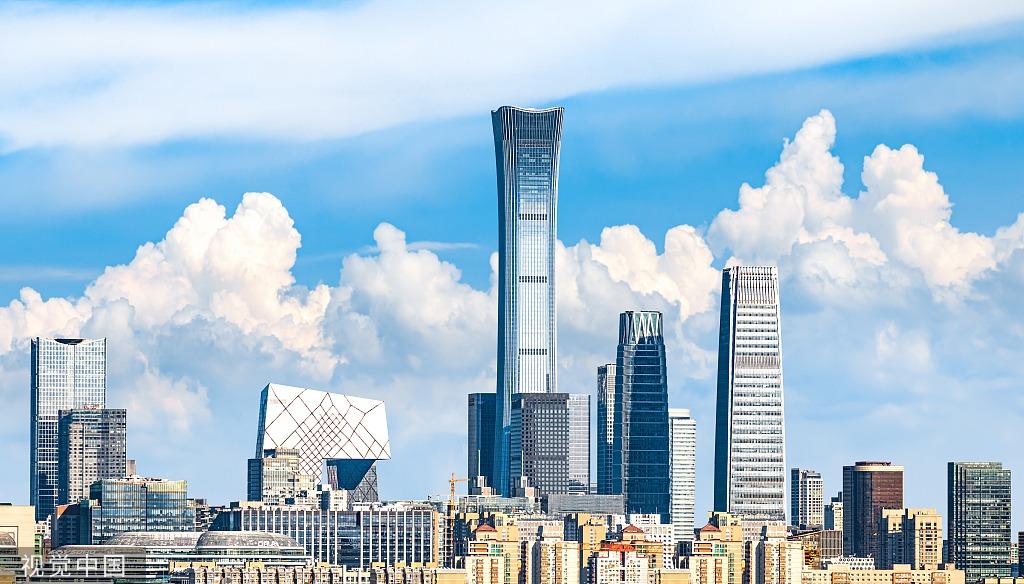 The skyline of Beijing. (PHOTO / VCG)
The skyline of Beijing. (PHOTO / VCG)
A decade ago in Beijing, air purifiers sold like hot cakes and people stayed indoors in an attempt to avoid the blanket of heavy smog outside. Breathing the polluted air was a serious health hazard.
Today, the same air purifiers gather dust as Beijing residents enjoy the great outdoors without the fear of falling ill, and fresh air is no longer a luxury.
The reversal over the past 10 years has been nothing short of remarkable. Chinese authorities often demonstrate the vast difference in air quality between then and now by pointing out the decrease in density of air pollutants in the atmosphere and the steady increase in the number of days with fairly good air quality each year.
The proportion of days with heavy air pollution in Beijing has dropped by nearly 95 percent over the past 10 years, falling from 58 days in 2013 to only three days in 2022. In 2013, the annual average PM2.5 concentration in the capital stood at 89.5 micrograms per cubic meter. Last year, the density fell to 30 mcg per cubic meter.
A recent study by a United States-based institute, however, highlights the effect of the improvement in air quality in a more direct manner — it means people in China can expect to live longer.
China's air pollution level in 2021 was 42.3 percent lower than what it was in 2013, the year when the country launched a "war against pollution", according to the annual Air Quality Life Index report, compiled by the Energy Policy Institute at the University of Chicago in late August.
"Due to these improvements, the average Chinese citizen can expect to live 2.2 years longer, provided the reductions are sustained," it said.
The world only experienced a "small decline" in air pollution levels between 2013 and 2021. The decline was "entirely due to China's progress", the report said.
It said, "Without China's steep decline in pollution, global average pollution would have increased slightly between 2013 and 2021."
China's "staggering success" in controlling air pollution happened after the country hammered out a National Air Quality Action Plan in the fall of 2013, it said. The document laid out specific targets to improve air quality by the end of 2017, including a $270 billion initiative to reduce pollution in the densely populated regions.
To realize these goals, the Chinese government restricted the number of cars on roads in large cities, axed capacity of smokestack industries, banned new coal plants in key regions and shifted from coal to natural gas and electricity as fuel to warm rural homes.
"At the foundation of those actions were common elements: political will and resources, both human and financial, that reinforced each other.
"When the public and policymakers have these tools, action becomes much more likely," it said.
Zhao Liang, who initiated a grassroots NGO called Airman in 2014 to concentrate on battling air pollution, is keenly aware of the role political will has played in driving air quality improvement in the country.
In the early days of the NGO, it was not easy for Zhao to gain access to either air polluters or government officials. But he has found the government "increasingly open" to NGOs like his.
In the top-level design of the Chinese government, a series of mechanisms have been introduced to put the pressure on grassroots officials to work harder, Zhao noted, citing the country's high-profile central environmental inspection that was launched in 2016 as an example.
Led by minister-level officials, inspection teams report to a central group led by a vice-premier of the State Council, China's Cabinet.
"When communicating with grassroots officials, they no longer say it is not important. That is a big change," Zhao said. "They are willing to communicate with us."
However, the pollution level in China still does not meet WHO recommended guidelines and remains a threat to life expectancy in the country, the report warned.
"If China is able to reduce its pollution from 2021 levels to meet the WHO guideline, and those reductions are permanently sustained, the average person in China would see their life expectancy increase by 2.5 years," it noted.


